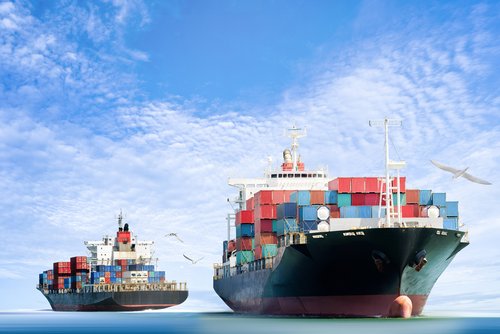Is Germany’s trade surplus really that bad? Those demanding action need to come up with better reasons than simply referring to economic models, writes a leading German economist.

Balanced Trade: What’s the Big Deal?
Germany’s large current-account surplus has given rise to a variety of economic arguments. The demands for economic action to address it are mostly derived from the claim that this surplus harms – depending on your perspective – the country, other countries, or both.
The discussion creates the impression that Germany’s external economic position is the consequence of a targeted, implied action by policymakers, and that correcting it merely requires political will on the macroeconomic front, alternatively policies to address wages or fiscal spending.
In an imaginary world of perfect balance – one which contains only homogeneous goods and is based on the theory that exchange rates, wages and prices are completely flexible – a persistent surplus (or deficit) in a country’s current-account balance shouldn’t really happen. Adjustments should be easily made through rising currencies, prices and wages.
This argument is often used implicitly in reference to the weak euro (from a German perspective) as an explanation of its current-account surplus. In fact, the argument seems to be inappropriate when you look at the changing external value of the euro and the persistent current-account surplus. At the same time, Switzerland, which has an even higher export rate than Germany, has shown that one can also have a rising current-account surplus even with continuing currency appreciation. In other words, the simple world of models isn’t helpful.
If we broaden our view to include the capital account as a mirror image of the current-account balance, assuming liberalized capital transactions, the idea that Germany has a fundamental imbalance with foreign economies becomes even more questionable. This is because the surplus in one is offset by a deficit in the other.
It’s easy to show that the capital account – which shows net changes in asset ownership – is the metric that actually dominates and sets the pace (rather than the trade surplus), due to the longer maturities of its underlying transactions. Germany’s capital account deficit is largely explained by a rise in savings of 5.5 percentage points since 2000, and a simultaneous decline in investments of 4.5 percentage points. This shifts the focus to demographics – Germany’s population is aging – as an explanation for the imbalance.
Clearly, economies can go through long phases of being relatively robust net capital market importers, like the United States, or net capital exporters, like Germany, and still be on the path to a comparatively-strong labor market. That’s the situation that exists in both countries at the moment, with unemployment at about 5 percent. The claim that Germany’s foreign investments are not beneficial for the country has also been partially refuted by an analysis by the German central bank, the Bundesbank. But even if this were not the case, it wouldn’t necessarily be the result of a market failure, as many economic policymakers would have you believe.
The debate over the surplus also often revolves around the issue of competitiveness – Germany is seen as “too competitive” by its critics. The argument usually collapses over a fundamental ideological dispute about whether entire economies can be said to be competitive, or whether the concept of competitiveness only applies to individual companies. At the very least, the argument should lead us to question just how much the country’s level of structural economic change – and the role it plays in the specialized global division of labor as a result – can really help to explain the German current account balance.
A few observations in this regard: First, economies with a large industrial component (such as Germany) tend to have a surplus in their current account balance. Second, since the beginning of the millennium, the German export quota has increased almost continuously from 25 percent to 46 percent; it is over this period that the divergence between exports and imports has taken shape. Thirdly, the German current account surplus (relative to GDP) is highly synchronized with global investment activity. Fourth, while weakness in German domestic demand may have curbed imports from 2001 to 2005, domestic demand has actually been growing and dynamic over the past five years – yet the current account surplus still hasn’t declined. This is attributable to the relief stemming from the oil price, and above all to the strong export dynamics.
In short, those who demand action from Germany’s lawmakers to address the imbalance must provide better reasons and should not – like the International Monetary Fund – simply complain about deviations from the world of models. And who is actually the injured party in all of this? That question has never really gotten a clear answer.
Of course, some changes to German policy make sense, such as liberalizing service sectors where this is reasonable. The need for reform also applies to addressing the country’s deficit in infrastructure spending. The problem here is not that money isn’t available, but that it is is not being disbursed. The simplification of planning procedures, the expansion of planning capacities and what have now become hypertrophic fire protection regulations should all be put to the test. Most of all, however, private investment must be encouraged through a corresponding agenda to improve tendering processes.
At any rate, one thing is clear: Germany cannot be accused of protectionism.
Read the article on global.handelsblatt.com
More on the topic
Not so Different?: Dependency of the German and Italian Industry on China Intermediate Inputs
On average the German and Italian industry display a very similar intermediate input dependence on China, whether accounting for domestic inputs or not.
IW
China’s Trade Surplus – Implications for the World and for Europe
China’s merchandise trade surplus has reached an all-time high and is likely to rise further. A key driver appears to be a policy push to further bolster Chinese domestic manufacturing production, implying the danger of significant overcapacities.
IW